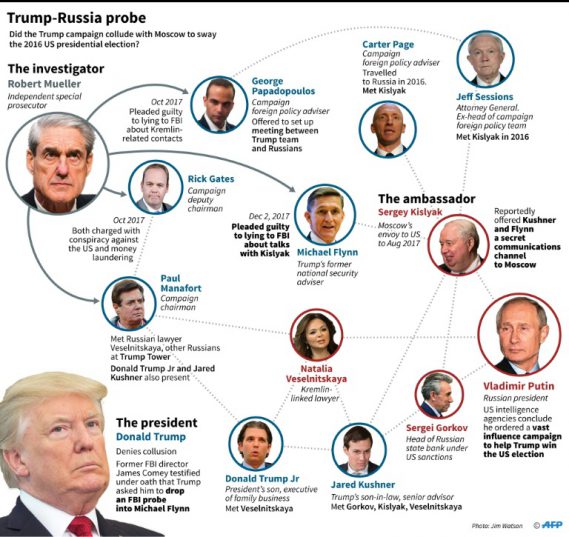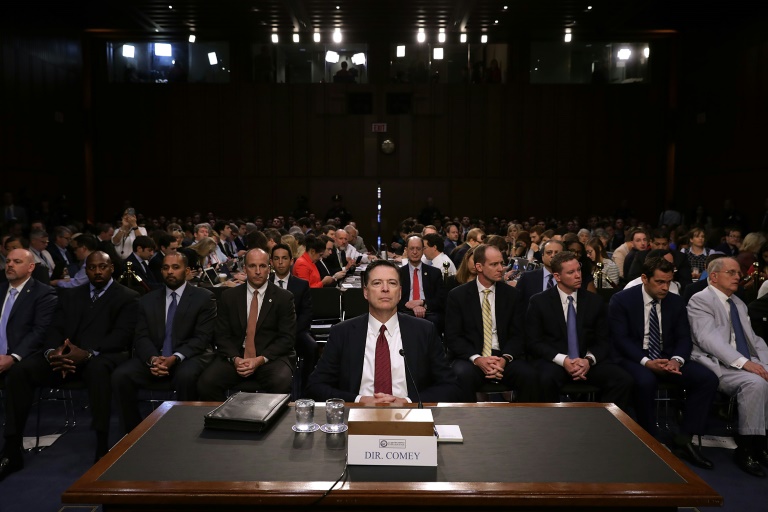Godrich Gardee replaces Floyd Shivambu as Malema returns for third term as EFF president
Flynn, the president’s former national security advisor, was the most senior of the four people charged so far in Mueller’s investigation into whether the Trump campaign colluded with Moscow to swing last year’s presidential election, and whether Trump tried to block the probe by firing FBI director James Comey.
By allowing Flynn, a former defense intelligence chief and a campaign insider, to plead guilty to a simple charge of lying to investigators, Mueller signalled that he expects to go higher up the ladder of political power in his investigation.
But Mueller’s end-game — who precisely is in his sights and for what — remains unclear.
The tall, gangly 73-year-old former FBI director, who almost never appears in public, is playing his cards tight to the chest, dropping hints in court filings rich enough to stir fears high into the White House, but too scant to discern his next moves.
“With Flynn’s plea deal, Mueller has nowhere to go but up the chain,” Asha Rangappa, a former FBI agent now lecturing at Yale University, told Politico.
– Hard-nosed investigators –

The Trump-Russia probe
Mueller’s team of hard-nosed investigators are particularly skilled in tracking money through international financial thickets, “flipping” witnesses against their bosses, and dealing with counter-intelligence probes.
Those skills have driven the indictments so far. On October 30 Mueller unveiled charges against former Trump campaign chairman Paul Manafort and his deputy Richard Gates, for conspiracy, money-laundering and related financial crimes tied to their work with pro-Moscow Ukrainian politician Viktor Yanukovych.
On the same day, separately, a Trump campaign foreign policy advisor, George Papadopoulos, pleaded guilty to lying to the FBI about his Kremlin contacts.
Then on Friday Mueller revealed Flynn’s plea deal, on charges he lied to investigators about discussions he had with Moscow’s ambassador Sergey Kislyak in December 2016.
– Attacking from the edges –
Each case shows Mueller attacking around the edges, probing vulnerabilities, deliberately stirring fear in potential targets, and meanwhile recruiting witnesses.

Special Counsel Robert Mueller is investigating whether the Trump campaign colluded with Moscow and if President Donald Trump tried to block the probe by firing FBI director James Comey (C)
Papadopoulos was a minor Trump campaign figure. But documents in his plea deal reveal that he built up contacts with Russians in London with the knowledge and support of his campaign supervisors.
Mueller described what Papadopoulos told campaign officials in emails about his Russian contacts, but did not reveal the names of whom the emails went to, and little about their replies. Court filings described them as “high ranking” campaign officials.
Two things are clear from the Papadopoulos case: his contacts help establish a pattern of engagement with the Russians by the campaign, and Mueller knows who in the campaign were directing them.
– Pinning down potential witnesses –
As for Manafort and Gates, by going after them on significant crimes only obliquely related to the focus of his probe — including laundering some $75 million — Mueller has in effect pinned them down for possible future use as witnesses.
Both were in a position to know whether the campaign was actively communicating with Russians when the election meddling took place. Manafort took part in a suspect June 2016 meeting with a Russian lawyer who had offered the campaign dirt on Clinton.
The Flynn case seems to show Mueller headed in another direction. The Russian contacts he lied about came after Trump’s election victory.
But analysts say Flynn helps Mueller build his cases on three fronts. First, Flynn would have had to promise Mueller something substantial against other, more senior targets of the investigation, to earn his plea deal, which amounts to a hand-slap.
Second, as a book-end to Papadopoulos, Flynn confirms the campaign had standing contacts with Russians. Again, no one specifically is named. Court filings by the Mueller team reference Flynn’s communications with a “senior” and then a “very senior” campaign official about his discussions with Kislyak.
They make clear that Flynn was operating at the direction of the campaign. Media reports have said that Trump’s son-in-law Jared Kushner is one of those referenced anonymously.
Third, Trump’s handling of Flynn, who was fired from the White House in February, could conceivably bolster a case for obstruction of justice against the president or others.
That is, at least, the message the White House took, since Mueller remains steadfastly quiet.
Trump lawyer John Dowd felt it necessary to tell the political news website Axios that the president cannot be guilty of obstruction of justice “because he is the chief law enforcement officer under (the Constitution) and has every right to express his view of any case.”
“There’s been absolutely no collusion,” Trump meanwhile said.
Download our app and read this and other great stories on the move. Available for Android and iOS.